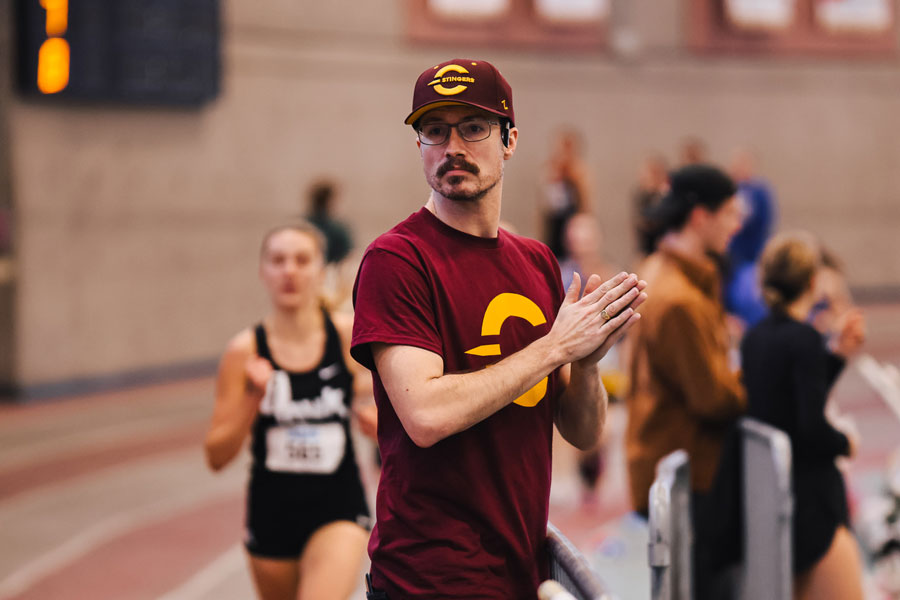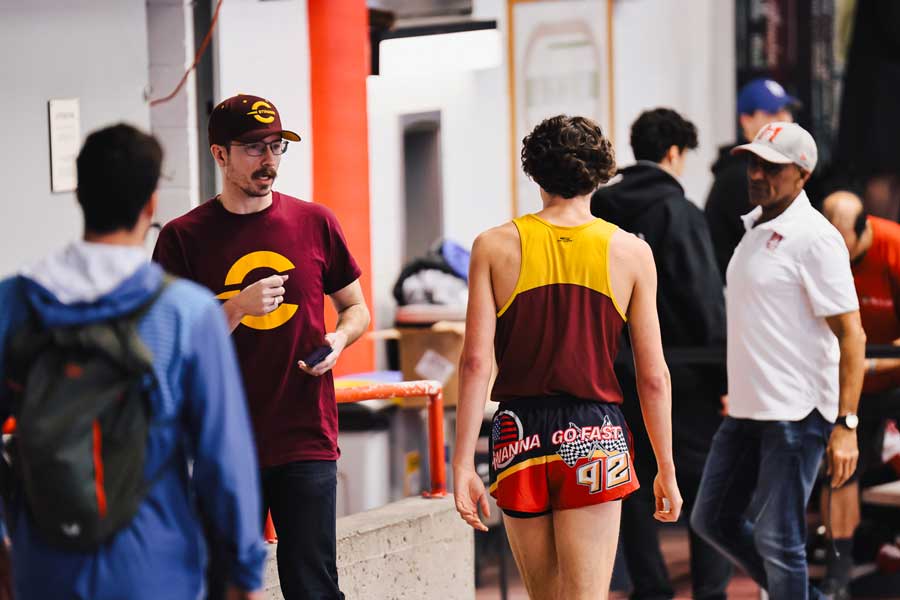
‘I love the sport of track and field’
Inspired by his time as a USask student-athlete, alumnus Dr. Justin Pfefferle (BA’05) becomes head coach of the Concordia University Stingers cross-country and track and field teams
By SHANNON BOKLASCHUKUniversity of Saskatchewan (USask) graduate Dr. Justin Pfefferle (BA’05) traces his current academic and career successes to his time as a USask student-athlete.
Pfefferle, who earned his Bachelor of Arts (honours) degree in English in 2005 as a USask College of Arts and Science student, was also a member of the Huskie Athletics track and field team from 2000 to 2003. A self-described “very proud” USask alumnus, Pfefferle admits that when he first began his undergraduate studies he wasn’t particularly drawn to academic life—but his interest in athletics served as his “gateway into being a student” at the university. As he became more involved in track and field, he also grew more interested in his academic courses, particularly his English classes.
After completing his English degree at USask, Pfefferle went on to earn a Master of Arts degree at Carleton University in 2007 and a PhD in English literature at McGill University in 2015. Since 2018, he has served as a faculty member in the Department of English at Dawson College in Quebec.
“Without the Huskie program, I don’t know what I would be doing today—but it wouldn’t be being a professor in an English department,” he said.
For Pfefferle, it was a natural fit to attend USask after being born and raised in Saskatoon. He recalls wearing Huskie Athletics-branded attire in his youth, and he notes that he only applied for admission to USask—it never occurred to him to apply anywhere else.
“I think what I love about the University of Saskatchewan is that it is so welcoming as a campus,” he said. “For me, at 13, I was doing sports camps at the University of Saskatchewan—and, like every kid, I had the shorts with the paws on the butt. I thought of myself as a future Huskie from the age of 12.”

By the end of his second year at USask, Pfefferle realized he had a passion for literature, art, cinema, and ideas. Seeing his fellow Huskie athletes succeed in their academic pursuits as well as in their athletic endeavours inspired him to try his best in all areas. He remembers with fondness the professors in the Department of English who made a big impact on him, including Professor Emeritus Dr. Robert Calder (BA’63, MA’65), Professor Emeritus Dr. Terry Matheson, and current faculty member Dr. Brent Nelson. As a young undergraduate student, Pfefferle felt nervous to knock on their office doors—but he was always welcomed in for engaging conversation. Pfefferle has a particularly clear memory of chatting with Calder about a novel.
“That was the moment I realized that these professors are hungry to talk about ideas; they love what they do,” he said. “That’s why I became a professor. I remember I was in a job interview a few years ago and they said, ‘What brought you to this profession?’ I had such great professors that I saw myself aspiring to want to be them. As a 19, 20, 21-year-old, I wanted to be as memorable as I found them to be.”
Today, Pfefferle is applying the lessons he learned as a USask student-athlete to his work inside and outside the classroom. In January 2024, Pfefferle was appointed as head coach of the Concordia University Stingers cross-country and track and field teams. He recently concluded his first season as head coach at Concordia, while also serving as co-head coach of the Dawson College Blues cross-country team.
Pfefferle co-founded the cross-country program at Dawson College three years ago with fellow co-head coach Jo Wedlock and was thrilled to also take on the coaching position at Concordia University when it was offered to him in December 2023.
“I love the sport of track and field, and I especially love coaching teams,” said Pfefferle, adding that he draws inspiration from the great coaches he had in high school and university.
Pfefferle also enjoys being a professor, describing post-secondary students as “the blood that runs through the veins of colleges and universities.”
“It’s the energetic minds who are encountering the stuff that transformed my life for the first time, and I get to witness it and I get to facilitate it,” he said. “I get to be the person—I hope—that I had in people like Bob and Terry and Brent.”
The Green&White asked Dr. Justin Pfefferle (BA’05) about his USask memories and his advice for student-athletes.
What is your favourite spot on the USask campus?
My favourite place on the USask campus is maybe a strange place to pick: It’s the Arts Tower stairwell.
Why did you choose that spot?
I have two dominant associations with this space: First, as a kid, my track coach used to take us here to do stair-climbing workouts. We’d start at the bottom, in the tunnel entrance, and go all the way up to the top. During our rest periods, I’d wander the halls of the tower and look at the professors’ doors and department offices. It seemed like such a serious, grown-up environment compared with my elementary and high school. I loved it. These workouts made me feel like this was an environment where I belonged. My second association is going up those stairs to visit professors in the English department during office hours. I was lucky to have professors who were very present and had a true open-door policy. The conversations we had about books, art, and life were transformative.
What is your favourite memory from your time at USask?
I don’t have a single memory that stands out, but when I think about my time at USask, I often imagine myself as a 20-year-old second-year student sitting in Dr. Robert Calder’s 20th-century British novels class. Bob was such a great professor: nothing flashy, no rhetorical tricks, no audio-visual aids; just a serious, professional academic standing at a lectern delivering insight after insight about some of the greatest fiction ever written.
What are your top 3 pieces of advice for success as a student-athlete?
My advice to student-athletes starts with this: Remember that you’re on a team. And, yes, that includes the team sport of track and field. When you go to practice, go with the intent of uplifting the people around you. If you’ve had a bad day, a stressful exam, whatever—trust that what you need is to think about other people for a while. That’s what your teammates are for: to give you an opportunity to uplift others. And trust that they’re coming to practice with the same intention. Uplift others and be uplifted by others in turn.
Second, I’d say to remember that the pressure you’re feeling when you’re trying to figure out how to be a student and athlete at the same time is a feature, not a bug. The dragons you have to slay aren’t a glitch; they’re what make the game! There’s a reason student-athletes perform better academically and report higher levels of life satisfaction after university: it’s because you’re the ones who have to figure out how to manage your time and energy, how to persevere, how to commit when it’s hard to commit.
Thirdly, hold yourselves to a high standard, but also be a friend to yourself; when you falter, talk to yourself like you’d talk to a friend. Giving yourself grace doesn’t mean letting yourself off the hook. It means acknowledging that you’re human, you’re imperfect, and the important thing is always “try again.”

